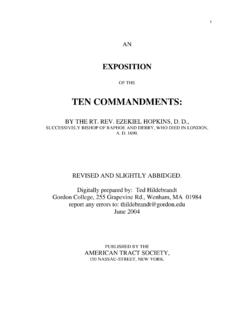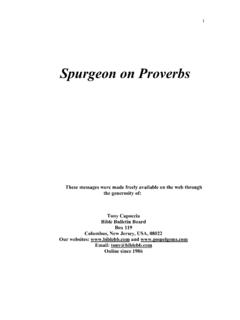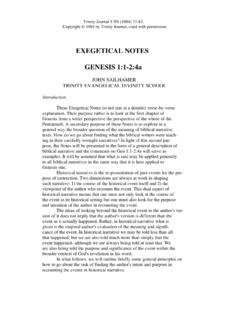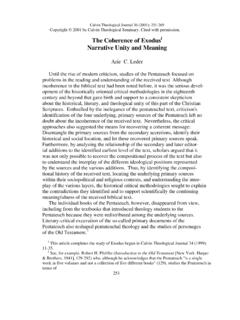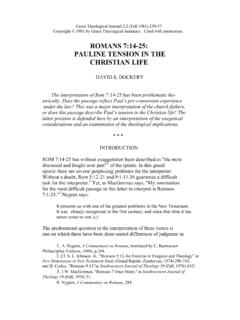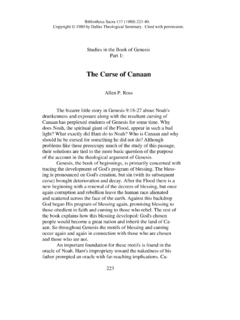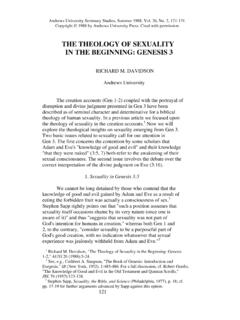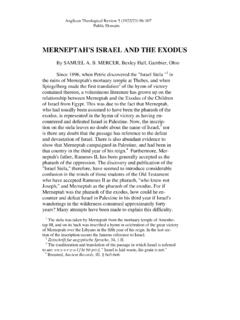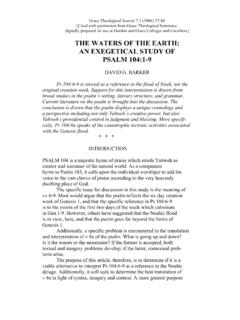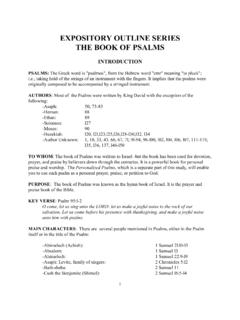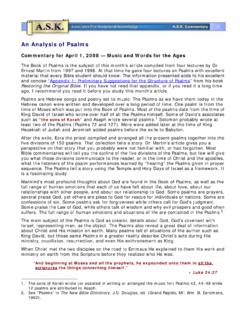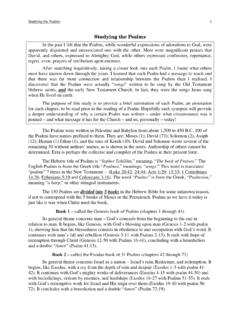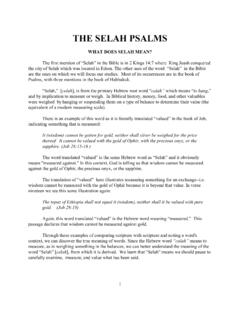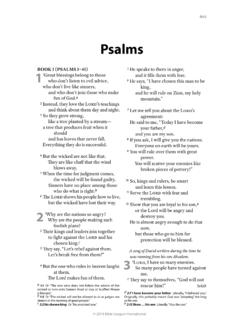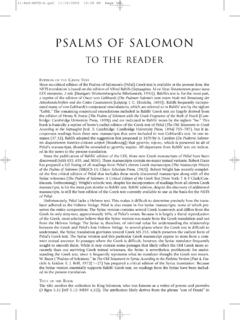Transcription of Commentary on the Book of Psalms - Gordon College Faculty
1 CLARK'S FOREIGN THEOLOGICAL LIBRARY VOLUME I. HENGSTENBERG'S Commentary ON THE Psalms . EDINBURGH: T. CLARK, 38, GEORGE STREET. MDCCCLXIX. Digitized by Ted Hildebrandt at Gordon College , Wenham, MA Spring, 2007 Commentary ON THE Psalms , BY E. W. HENGSTENBERG, DOCTOR AND PROFESSOR OF THEOLOGY IN BERLIN FOURTH EDITION, CAREFULLY REVISED.
2 EDINBURGH: T. & T. CLARK, 38, GEORGE STREET. LONDON: HAMILTON, ADAMS, AND CO.; SIMPKIN, MARSHALL, AND CO. DUBLIN : JOHN ROBERTSON AND CO. 1869. THE book OF Psalms . PSALM FIRST. THE Psalmist begins by extolling the blessedness of the right- eous, who is first described negatively, as turning away from the counsels of the wicked, ver. 1, and then positively, as having his thoughts engrossed with the Divine law, ver. 2. He proceeds next to delineate under a pleasant image the prosperity which attends him in all his ways, and places in contrast to this, the destruction which is the inseparable concomitant of the wicked, vers.
3 3, 4. He grounds upon these eternal principles the confi- dence, that God will take out of the way whatever, in the course of events, appears to be at variance with them; that by His judg- ment He will overthrow the wicked, through whose malice the righteous suffer, and free His Church, which must consist only of the righteous, from their corrupting leaven; and, as it was declared, in vers. 3 and 4, that the Lord interests Himself in the righteous, and hence could not leave them helpless, while de- struction is the fate of the wicked, the former must in conse- quence be exalted above the latter, vers. 5, 6. According to this order, which alone secures to the "there- fore" at the beginning of ver. 5, and the "for" in ver. 6, their proper meaning, the Psalm falls into three strophes, each con- sisting of two verses.
4 The Psalm is primarily of an admonitory character. What it says of the prosperity which attends the righteous, and the perdition which befalls the wicked, cannot but incite to imitate the one, and shun the other. In reference to this Luther re- marks: "It is the practice of all men to inquire after blessed- ness; and there is no man on earth who does not wish that it 12 THE book OF Psalms . might go well with him, and would not feel sorrow if it went ill with him. But he, who speaks in this Psalm with a voice from heaven, beats down and condemns everything which the thoughts of men might excogitate and devise, and brings forth the only true description of blessedness, of which the whole world knows nothing, declaring that he only is blessed and prosperous whose love and desire are directed to the law of the Lord.
5 This is a short description, one too that goes against all sense and reason, especially against the reason of the worldly-wise and the high- minded. As if he had said: Why are ye so busy seeking counsel? why are ye ever in vain devising unprofitable things? There is only one precious pearl; and he has found it, whose love and desire is toward the law of the Lord, and who separates him- self from the ungodly all succeeds well with him. But who- soever does not find this pearl, though he should seek with ever so much pains and labour the way to blessedness, he shall never find it." The Psalm has, besides, a consolatory character, which comes clearly out in the last strophe; for it must tend to enliven the hope of the righteous in the grace of God, and fill them with confidence, that everything which now appears contrary to their hope, shall come to an end; that the judgment of God shall remove the stumbling-blocks cast in their way by the temporal prosperity of the wicked, and the troubles thence accruing to them.
6 The truth contained in this Psalm is as applicable to the Church of the New Testament as to that of the Old. It remains perpetually true, that sin is the destruction of any people, and that salvation is the inseparable attendant of righteousness. Whatever, in the course of things, seems to run counter to this, will be obviated by the remark, that a righteous man, as the author delineates him, one whose desire is undividedly fixed upon the law of God, and to whom it is "his thought by day and his dream by night," is not to be found among the children of men. Just because salvation is inseparably connected with righteousness, an absolute fulfilment of the promise of the Psalm cannot be expected. For even when the innermost bent of the mind is stedfastly set upon righteousness, there still exist so many weaknesses and sins, that sufferings of various kinds are necessary, not less as deserved punishments, than as the means of improvement, which, so far from subverting the PSALM I.
7 3 principles here laid down, serve to confirm them. The senti- ment, that "everything he does, prospers," which is literally true of the righteous, in so far as he is such, passes, in conse- quence of the imperfect nature of our righteousness, which alone can be charged with our loss of the reward that is promised to the perfect, into the still richly consolatory truth, that "all things work together for good to them who love God." Those who are blinded by Pelagianism, who know not the limited na- ture of human righteousness, and consequently want the only key to the mystery of the cross, do apprehend the truth of the main idea of the Psalm, but at the same time escape from it only by surrendering themselves to a crude Dualism. It is unques- tionable, say they, that the internal blessedness of life has no other ground than genuine piety; but as for outward things, "which depend upon natural influences, the relations and acci- dents of life, and the violent movements of the populace," one can make no lofty pretensions to them.
8 Who can but feel that natural influences and such like things are here placed in com- plete independence of God, are virtually raised to the condition of a second God, and that we are at once translated from a Christian into a heathen sphere, in which latter, accident, fate, Typhon, Achriman, play a distinguished part, and all on the same ground, to wit, the want of that knowledge of sin, which peculiarly belongs to revelation? Such masters must not take it upon them to instruct the Psalmist, but must learn of him. Whoever really believes in one true God, the Creator, Preserver, and Governor of the world, cannot but accord with the doctrine of the Psalmist. It is impossible to disparage in the least the doctrine of recompense, without trenching closely upon the truth of one God.
9 Internal good, as the perfect, is contrasted with external, as the imperfect. But where, in reality, is the man, who enjoys complete inward blessedness who, even though labouring under the greatest delusion regarding his state, can spend so much as one day in perfect satisfaction with himself? Besides, is it not natural, that the external should go hand in hand with the internal? And have we any reason, on account of the troubles which befall us, to doubt the omnipotence and righteousness of God, and the truth of that doctrine of Scrip- ture, which pervades both economies, and appears in every book from Genesis to Revelation, that God will recompense to every one according to his works? Instead of running into such 4 THE book OF Psalms . mournful aberrations, it behoves every one, when he reads what the Psalmist says of the righteous "And he shall be like a tree planted by the rivers of water, that bringeth forth his fruit in his season, his leaf also shall not wither, and whatsoever he doeth shall prosper" and finds that his own condition pre- sents a melancholy contrast to what is here described, to turn back his eye upon the first and second verses, and inquire whether that which is there affirmed of the righteous will apply to him.
10 And if he finds it to be otherwise, then should he smite upon his breast, and cry, "God be merciful to me a sinner," and thereafter strive with all earnestness to realize the pattern there delineated, by employing the means which God has ap- pointed for the purpose. The subject of the Psalm is, as might be judged from the previous remarks, quite general, and it is an error in several expositors to refer it to particular times and persons. There is great probability in the opinion of those, who suppose with Calvin, that this Psalm, originally occupying another position, was placed by the collector of the Psalms , as an introduction to the whole. Basilius calls it a "short preface" to the Psalms ; and that this view is of great antiquity, may be gathered from Acts xiii.

